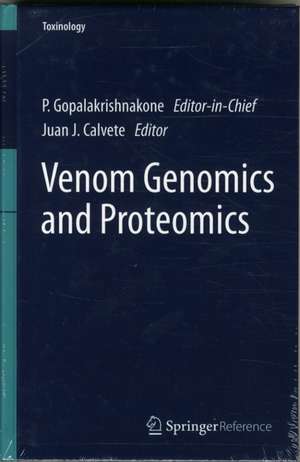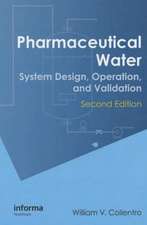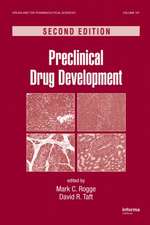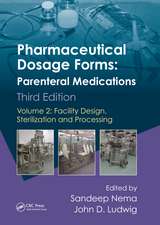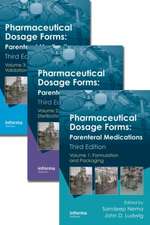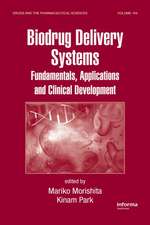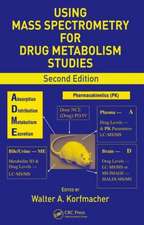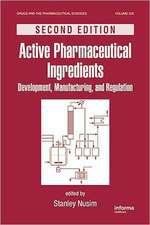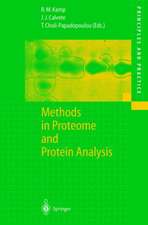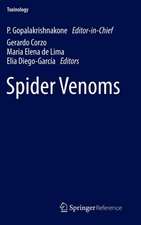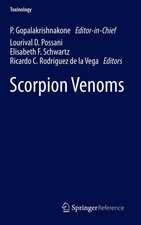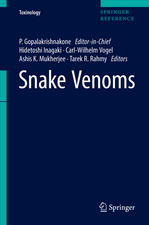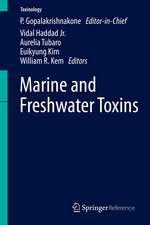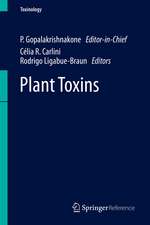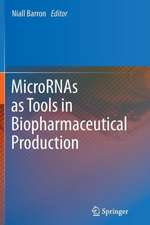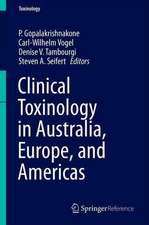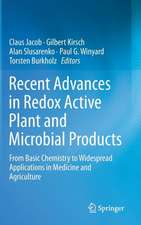Venom Genomics and Proteomics: Toxinology
Editat de P. Gopalakrishnakone, Juan J. Calveteen Limba Engleză Hardback – 14 ian 2016
VenomGenomics and Proteomics covers research into the venom of scaled reptiles (lizards andsnakes), scorpions, spiders, ants and platypuses. Special consideration isgiven to a number of observations made in the area of snake venom and in theapplication of advanced genomics and proteomics techniques on a variety ofvenom samples. The final chapters give some insight into the potential clinicaluses of venom derivatives and into the importance and challenges faced in theproduction and quality control of antivenoms.
Preț: 1578.54 lei
Preț vechi: 2077.03 lei
-24% Nou
Puncte Express: 2368
Preț estimativ în valută:
302.09€ • 314.22$ • 249.39£
302.09€ • 314.22$ • 249.39£
Carte tipărită la comandă
Livrare economică 09-15 aprilie
Preluare comenzi: 021 569.72.76
Specificații
ISBN-13: 9789400764156
ISBN-10: 9400764154
Pagini: 480
Ilustrații: XXI, 454 p. 81 illus., 65 illus. in color.
Dimensiuni: 155 x 235 x 24 mm
Greutate: 1.06 kg
Ediția:1st ed. 2016
Editura: SPRINGER NETHERLANDS
Colecția Springer
Seria Toxinology
Locul publicării:Dordrecht, Netherlands
ISBN-10: 9400764154
Pagini: 480
Ilustrații: XXI, 454 p. 81 illus., 65 illus. in color.
Dimensiuni: 155 x 235 x 24 mm
Greutate: 1.06 kg
Ediția:1st ed. 2016
Editura: SPRINGER NETHERLANDS
Colecția Springer
Seria Toxinology
Locul publicării:Dordrecht, Netherlands
Public țintă
ResearchCuprins
Deadly Innovations: Unraveling the Molecular Evolution of AnimalVenoms.- Squamate Reptile Genomics and Evolution.- Venoms of Colubrids.- Phylogeneticsof Scorpions of Medical Importance.- Scorpion Venom Gland Transcriptomics andProteomics: An Overview.- Brown Spider Venom: The Identification andBiotechnological Potential of Venom Toxins.- Venom Toxins of Fire Ants.- ThePlatypus: A Venomous Mammal.- Structure-Function Relationship of ModularDomains of P-III Class.- Snake Venom Metalloproteinases.- BiologicalActivities and Assays of the Snake Venom Metalloproteinases (SVMPs).- Three-DimensionalStructures and Mechanisms of Snake Venom Serine Proteinases,Metalloproteinases, and Phospholipase A2s.- Structure-Function Relationship inHeterodimeric Neurotoxin PLA2s from Viperidae Snakes Inhabiting Europe, SouthAmerica, and Asia.- Snake Venom Phospholipase A2: Evolution and Diversity. - AutomatedMass Fingerprinting of Venoms in Nanogram Range: Review of Technology.- SnakeVenom Peptidomics.- Snake Venom Proteopeptidomics: What Lies Behind theCurtain.- Shotgun Approaches for Venom Analysis.- Purinergic Mechanisms ofPrey Acquisition by Venomous Organisms.- Applications of Snake Toxins inBiomedicine.- Industrial Production and Quality Control of Snake Antivenoms.
Notă biografică
Prof P. Gopalakrishnakone, M.B.B.S., Ph.D., F.A.M.S., D.Sc., is presently professor of anatomy and chairman of the Venom and Toxin Research Programme at Yong Loo Lin School of Medicine, National University of Singapore. He is also a consultant to the Defence Science Organization in Singapore and adjunct senior research scientist at the Defence Medical Research Institute. Prof. Gopalakrishnakone is an honorary principal fellow at the Australian Venom Research Unit, University of Melbourne, Australia. His research studies include structure function studies, toxin detection, biosensors, antitoxins and neutralization factors, toxinogenomics and expression studies, antimicrobial peptides from venoms and toxins, and PLA2 inhibitors as potential drug candidates for inflammatory diseases. The techniques he employs include quantum dots to toxinology, computational biology, microarrays, and protein chips. Prof. Gopalakrishnakone has more than 160 international publications, four books, about 350 conference presentations, and 10 patent applications. He has been an active member of the International Society on Toxinology (IST) for 30 years and was president from 2008 to 2012. He is also the founder president of its Asia Pacific Section, a council member, as well as an editorial board member of Toxicon, the society’s official journal. His research awards include the Outstanding University Researcher Award from the National University of Singapore (1998); Ministerial Citation, NSTB Year 2000 Award in Singapore; and the Research Excellence Award from the Faculty of Medicine at NUS (2003). His awards in teaching include Faculty Teaching Excellence Award 2003/4 and NUS Teaching Excellence Award 2003/4. Prof. Gopalakrishnakone also received the Annual Teaching Excellence Award in 2010 at both university and faculty levels.
Dr. Juan J. Calvete (Valencia, Spain, 1957) is research professor of the Spanish Research Council (CSIC) and head of the Structural and Functional Venomics Laboratory at the Instituto de Biomedicina de Valencia. He studied biology at the University of Valencia, and earned his Ph.D. degree in biochemistry from Complutense University (Madrid, 1985). Dr. Calvete completed post-doctoral training in protein chemistry and structural biology at the Banting Institute (Toronto, Canada, 1987), the Max-Planck-Institute für Biochemie (Martinsried, Germany, 1988–92), and the Institut für Reproductionsmedizin (Hannover, Germany, 1993–98) prior to assuming his current position in the Instituto de Biomedicina de Valencia in 1998. Dr. Calvete has coauthored more than 380 scientific publications in peer-reviewed journals and monographic books, which have received over 13,600 citations according to the Google Scholar database. His current research focuses on structural and functional proteomics of snake venoms, having developed proteomics-based tool (“venomics” and “antivenomics”) for exploring the evolution, composition, interactions with antivenoms, and biotechnological applications of venoms and toxins. Since 2011, Dr. Calvete serves as president of the European Section of the International Society on Toxinology. Dr. Calvete has served as first president of the Spanish Proteomics Society (SEProt). Currently, he is an editorial board member of Toxicon, Journal of Venom Research, Toxins, and editor-in-chief of the Journal of Proteomics.
Dr. Juan J. Calvete (Valencia, Spain, 1957) is research professor of the Spanish Research Council (CSIC) and head of the Structural and Functional Venomics Laboratory at the Instituto de Biomedicina de Valencia. He studied biology at the University of Valencia, and earned his Ph.D. degree in biochemistry from Complutense University (Madrid, 1985). Dr. Calvete completed post-doctoral training in protein chemistry and structural biology at the Banting Institute (Toronto, Canada, 1987), the Max-Planck-Institute für Biochemie (Martinsried, Germany, 1988–92), and the Institut für Reproductionsmedizin (Hannover, Germany, 1993–98) prior to assuming his current position in the Instituto de Biomedicina de Valencia in 1998. Dr. Calvete has coauthored more than 380 scientific publications in peer-reviewed journals and monographic books, which have received over 13,600 citations according to the Google Scholar database. His current research focuses on structural and functional proteomics of snake venoms, having developed proteomics-based tool (“venomics” and “antivenomics”) for exploring the evolution, composition, interactions with antivenoms, and biotechnological applications of venoms and toxins. Since 2011, Dr. Calvete serves as president of the European Section of the International Society on Toxinology. Dr. Calvete has served as first president of the Spanish Proteomics Society (SEProt). Currently, he is an editorial board member of Toxicon, Journal of Venom Research, Toxins, and editor-in-chief of the Journal of Proteomics.
Caracteristici
Presents recent advances in biotechnological applications of venom toxins Covers research into the venom of lizards, snakes, scorpions, spiders, ants and platypuses Illustrates the issues in the production and quality control of antivenoms Includes supplementary material: sn.pub/extras
